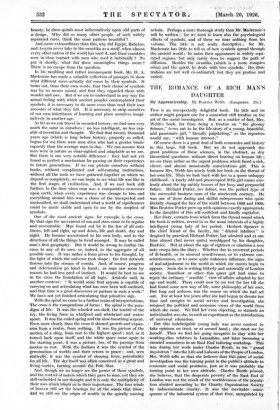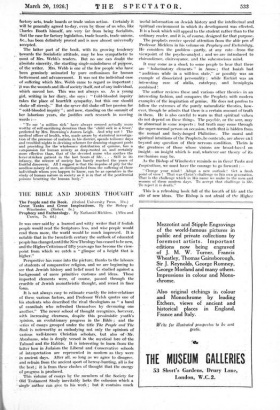THE ROMANCE OF A RICH MAN'S DAUGHTER
My Apprenticeship. By Beatrice Webb. (Longman. 21a.) Tins is an unexpectedly delightful book. Its title and its author might prepare one for a somewhat stiff treatise on the art of the social investigator. But, as a matter of fact, Mrs. Webb's book, far from being a treatise on " the gloomy Science," turns out to be the life-stOrY of a young, beautiful, and passionate girl, " literally pIllpitating,' as the reporters would say, " with human interest."
Of course there is a great deal of both economics and history in this large, full book. But we do not apprOach the great problems of .these sciences, in the abstract, as dry theoretical questions, without direct bearing on human life ; we see them rather as the urgent problems which faced a rich, clever, and almost unnaturally conscientious girl. This is because Mrs. Webb has wisely built her book on the thread of her own life. Thus we look back with her to a queer unhappy childhood. A lonely odd and preoccupied little girl roams aim- lessly about the big untidy houses of her busy and purposeful father. Richard Potter, her father, was the perfect type of the successful business man of the nineteenth century. He was one of those daring and skilful entrepreneurs who quite literally changed the face of the world between 1800 and 1900. Miss Beatrice Potter grew up with opinions exactly appropriate to the daughter of this self-confident and kindly capitalist.
Her diary, extracts from which form the thread round which the book is written, reveal to us the usual interests of a highly intelligent young lady of her period. Herbert Spencer is the .chief friend of the family, his " dilated intellect" is despised by practical Richard Potter, but admired and at one time almost (but never quite) worshipped by his daughter, Beatrice. But at about the age of eighteen or nineteen a new note creeps into the diary. Whether due to recurrent periods of ill-health, or to unusual sensitiveness, or to extreme con- scientiousness, or to some quite unknown influence, the signs of mal-adjustment to the world in which she moves begin to appear. Soon she is writing bitterly and satirically of London society. Somehow or other this queer girl had come to reject the ordinary " sensible " view of affairs adopted by her age and world. There could now be no rest for her till she had found some new way of life, some philosophy of her own. But long and arduous was the course on which she had set out. For at least ten years after she had begun to devote her time and energies to social service and investigation, she retained the political and economic views of the world from which she came. We find her even objecting, so staunch an individualist was she, to such an experiment as the introduction of -universal education.
But this indefatigable young lady was never content to ,take opinions on trust, or at second hand ; she must see for herself. Thus we find her going incognito to stay with' her (working-class relatives in Lancashire, and later becoming a !sweated seamstress in an East End tailoring workshop. This .*as during' her work under Charles Booth, in his " grand inquisition into the Life and-Labours of the People oflondod. Mrs. Webb -tells us that she believes that this piece of social investigation was the turning point in the-public's attitude to eeonomie and- social problems, just. as it was probably the turning point in her own attitude. Charles Booth proved; She believes, that the desperate poverty of the East End of London was not the result of the worthlessness of the popula- tion abetted according to the Charity Organization Society by indiscriminate charity. It was the inevitable come- quence of the industrial system of that time, unregulated by factory acts, trade boards or trade union action. Certainly it _will be generally agreed to:day, even by those of its who, like
Charles Booth himself, are . very far from being Socialists, that the case for factory legislation, trade boards, trade unions, &c., has been definitely proved and is now almost universally accepted. _ The latter part of the book, with its growing tendency
towards the SoCialistic attitude, may be less sympathetic to most of Mrs. Webb's readers, But no one can doOt the absolute sincerity, the startling single7mincledness of purpose, of the writer. Mrs. Webb is one of the few .people who have been genuinely animated by pure enthusiasm for human
betterment and advancement. It was not the individual ease of suffering which Mrs. Webb came to regard as important ; it was the wounds.and ills of society itseif, not of any individual, which moved her. This was not always so. As a young girl, writing in her diary, she says : " Cold-blooded inquiry takes the :place of heartfelt syipathy, but thiS one should shake off sternly." But she never did shake off her passion for " cold-blooded inquiry" ; and now, standing on the summit of her- laborious years, she justifies such research in moving words :—
"-To me ' a million sick' have always seemed actually more worthy of self-sacrificing 'devotion than the ' child sick in a fever,' preferred by Mrs. Browning's Aurora Leigh. And why not ? The medical officer of health, who, made aware by statistical investiga- tion of the presence of malaria in his district, spends toilsome days and troubled nights in devising schemes for draining stagnant pools and providing fbr the 'wholesome 'distribution of quinine, has a compassion for human misery as deep-rooted as, and certainly more effective than, that of the devoted nurse who soothes the fever-stricken patient in the last hours of life. . . . Still in its infancy, the science of society has barely reaehed the years of fruitful discovery. All I suggest is that the impulse of pity for the needless misery of men, as distinguished from the suffermg of those individuals whom you happen to know, can be as operative in the study of human nature in society as it is in that of the pestilential poisons besetting the human body."



























































 Previous page
Previous page